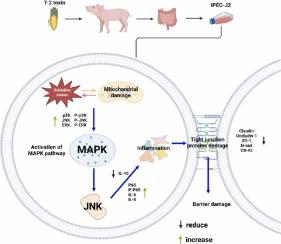Ecotoxicology and Environmental Safety ( IF 6.2 ) Pub Date : 2023-07-13 , DOI: 10.1016/j.ecoenv.2023.115247 Fengjuan Chen 1 , Youshuang Wang 1 , Yunhe Chen 1 , Jiayan Fan 1 , Cong Zhang 1 , Xiuyuan He 1 , Xu Yang 1

|
The most prevalent contaminated mycotoxin in feed and grain is T-2 toxin. The T-2 toxin's primary action target is the gut because it is the main organ of absorption. T-2 toxin can cause intestinal damage, but, few molecular mechanisms have been elucidated. It is important to discover the key pathways by which T-2 toxin causes enterotoxicity. In this research, IPEC-J2 cells are used as a cell model to investigate the function of the MAPK signaling pathway in T-2 toxin-induced intestinal epithelial cell damage. Throughout this research, T-2 toxin results in functional impairment in IPEC-J2 cells by reducing the TJ proteins Claudin, Occludin-1, ZO-1, N-cadherin, and CX-43 expression. T-2 toxin significantly reduced the survival of IPEC-J2 cells and increased LDH release in a dose-dependent way. T-2 toxin induced IPEC-J2 cell oxidative stress by raising ROS and MDA content, and mitochondrial damage was indicated by a decline in MMP and an increase in the opening degree of MPTP. T-2 toxin upregulated the expression of ERK, P38 and JNK, which triggered the MAPK signaling pathway. In addition, T-2 toxin caused IPEC-J2 cell inflammation responses reflected by increased the levels of inflammation-related factors IL-8, p65, P-p65 and IL-6, and down-regulated IL-10 expression level. Inhibition JNK molecule can ease IPEC-J2 cell functional impairment and inflammatory response. In conclusion, as a consequence of the T-2 toxin activating the JNK molecule, oxidative stress and mitochondrial damage are induced, which impair cellular inflammation.
中文翻译:

JNK分子是T-2毒素诱导的IPEC-J2细胞屏障损伤的毒性靶标
饲料和谷物中最常见的受污染霉菌毒素是 T-2 毒素。T-2 毒素的主要作用目标是肠道,因为它是主要的吸收器官。T-2毒素可引起肠道损伤,但目前阐明的分子机制还很少。发现 T-2 毒素引起肠毒性的关键途径非常重要。本研究以IPEC-J2细胞为细胞模型,研究MAPK信号通路在T-2毒素诱导的肠上皮细胞损伤中的功能。在整个研究中,T-2 毒素通过减少 TJ 蛋白 Claudin、Occludin-1、ZO-1、N-cadherin 和 CX-43 的表达,导致 IPEC-J2 细胞功能受损。T-2毒素显着降低IPEC-J2细胞的存活率并以剂量依赖性方式增加LDH释放。T-2毒素通过提高ROS和MDA含量诱导IPEC-J2细胞氧化应激,MMP下降和MPTP开放程度增加表明线粒体损伤。T-2毒素上调ERK、P38和JNK的表达,从而触发MAPK信号通路。此外,T-2毒素引起IPEC-J2细胞炎症反应,表现为炎症相关因子IL-8、p65、P-p65和IL-6水平升高,IL-10表达水平下调。抑制JNK分子可以缓解IPEC-J2细胞功能损伤和炎症反应。总之,T-2 毒素激活 JNK 分子,会诱导氧化应激和线粒体损伤,从而损害细胞炎症。































 京公网安备 11010802027423号
京公网安备 11010802027423号